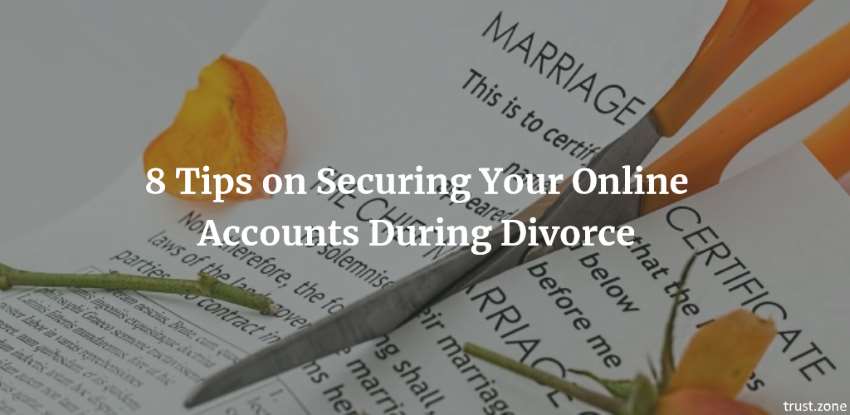In the USA, almost 39% of marriages end in divorce. If your marriage is one of them, then you probably have already consulted with a lawyer on your privacy issue. Probably you were surprised to hear that one of the most important things you need to protect in divorce is your digital data. Nevertheless, it is true. No matter how peaceful your separation is there may be a lot of information that you don’t want your spouse’s attorney to produce in court.
After two people become a family, it is hard for them to make a clean break, especially today, when everybody is too dependent on the Internet. Below there are seven useful tips on how to secure your online accounts during a divorce properly.

After filing for divorce, take the needed steps to protect your all personal accounts. It is better if you start with your email account mainly because your other accounts are likely to be linked to it. As long as your soon-to-be ex-spouse can access your emails, he or she probably can access any other account registered in your name. As soon as your email password is changed, proceed with your Windows or iOS account, your credit card, social media, app store, banking, and other accounts. However, this is not always true for a divorce website account, as your spouse may need to access it too.
First of all, you should make sure that your spouse cannot access your emails and messages nor before neither after you start filling out divorce forms. For this, a password for your email account must be changed, and unlock codes for your all devices must be reset. When it comes to money-sharing apps, you need to protect them too by changing your passwords, selecting a security question and using a VPN to secure your online banking
Another thing to do is to check if your soon-to-be ex-spouse can track your movements. Have you ever enabled any tracking location services for your accounts? If so, then disable them as soon as possible.
If you believe that your ex-love is trying to spy on you, VPN is a great way of protecting your data. Every time you browse the internet you transmit data onto the public internet, which makes it possible for someone to intercept that data. Using a VPN makes it look like the data is coming from that virtual private network server, shielding your data from being tracked.
Use a VPN when connecting public Wi-Fi. Someone can set up fake FREE Wi-Fi hotspots to steal your identity and personal details. Free Wi-Fi hotspots might actually be run by hackers to steal your private data, financial information, passwords or browser history.
When creating new passwords, use as many characters as possible – twelve-character combinations are much harder to crack than eight-character ones. Make sure that you don’t use the same password for two different accounts. Also, avoid using your children’s and pets’ names, birth dates, etc. Random characters combined with digits and a blend of lower- and upper-case are the best choice. Consider using a password management tool for more convenience too.
Set up your privacy settings so your spouse cannot view what you post. However, even if you know that your soon-to-be ex-spouse doesn’t see your content, you cannot say the same about his or her attorney or your mutual friends. That is why it is better to stop posting on social at least until your final divorce decree is signed. Also, make sure that you disable all location tracking options on your social media accounts, too.
When changing passwords, you can ensure better security by turning on 2-step verification. If you enable this option, you will have to provide a code that will be sent on your tablet or smartphone every time you want to log in. This is how you can prevent your ex-partner from cracking your passwords and accessing your personal information without your permission.
Remember that until your divorce is over, no information should be deleted from anywhere. For example, if you decide to get rid of some social media posts, this act may be considered to be evidence tampering, and be sure that no court will ignore this fact. And if you delete something, your ex and his or her attorney can claim that whatever they try to prove it true and produce the deleted information as proof in court. So, remember that you can do whatever it takes to protect your information, but you shouldn’t do anything to delete it at least without talking to your lawyer first.
This type of software is usually installed on different devices, most often for a fee. Your ex can use different types of spying software to read your emails and messages, look through your browsing history, and monitor what you type into a keyboard. Even though installing this type of software on someone’s laptop or smartphone is considered illegal, things get a bit complicated when it comes to marital assets. Read a complete guide on how to know if your smartphone has been hacked and how to fix it. Using a VPN while browsing on the web makes you invisible on the Internet. Your browsing history will be hidden from prying eyes.
From now on, it is important to understand that your life is going to change a lot. What you and your soon-to-be ex-spouse have shared is to be divided and used separately. So, keeping a journal of the services, subscriptions, and devices that need to be protected may help.
Author Bio:
Scott Craft is a single father, freelance writer, and customer service representative at OnlineDivorcer, a website that specializes in preparing court divorce forms for uncontested cases. As a freelance writer, he has written dozens of blogs covering divorce-related topics on financial, child support, and cybersecurity issues.